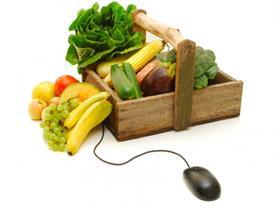
New research conducted by packaging leader Amcor has revealed the differences in European consumer attitudes to buying grocery products online.
Amcor’s study surveyed 1,000 online grocery shoppers across France, the UK, Germany, Netherlands and Sweden, to study their buying preferences and understand wider ecommerce trends in Europe.
The food and drinks industries are rapidly catching up to the rise of ecommerce, and in Europe alone, the online grocery market is expected to grow by 66 per cent by 2023 while Nielsen forecasts that 70 per cent of consumers globally will do their grocery shopping online by 2024.
Research highlights
UK consumers set themselves apart from their European neighbours in their willingness to buy fresh food online, Amcor's research found.
Most (69 per cent) buy the same amount of food, or more, online than in store – compared to only 30 per cent of Europeans in other countries.
The top reason shoppers gave for buying more online was convenience. They perceived a time saving, as well as noting the ease of delivery versus having to carry groceries home.
The research also revealed why consumers in other European nations may not be embracing online purchases of fresh food to the same degree as the UK.
This is largely because of concerns about freshness, with 61 per cent of European shoppers preferring to see and test fresh produce before buying it.
Specifically, 78 per cent of French shoppers want to physically check the quality of fresh produce before they buy whilst 77 per cent of Germans prefer to buy produce from stores daily to avoid food waste.
Food subscriptions are increasing in popularity across Europe, with Dutch shoppers leading the trend, saying they subscribe to fruit and veg deliveries (36 per cent), coffee deliveries (36 per cent) and snack subscriptions (34 per cent).
Across the rest of Europe just over a quarter (26 per cent) of respondents in Britain, Sweden and the Netherlands said they had used a meal kit subscription.
The most popular fresh food category for online purchase was dairy, followed by (fruit and vegetables 54 per cent) which was the most popular option for food subscriptions – but this only applies to whole produce.
Meanwhile, pre-packed vegetables and pre-cut fruit were a less popular option, at 36 per cent and 22 per cent respectively.
'European shoppers might enjoy having fresh fruit and vegetable delivered to their door, but they’ll do the chopping themselves,' Amcor noted.
Packaging
The biggest packaging consideration for consumers was sustainability, Amcor found, which was the primary packaging requirement for 65 per cent of consumers.
Recyclable packaging was the primary sustainability attribute online shoppers looked for. Amcor’s research showed that over a third of online consumers believe packaging recyclability to be very important to them.
Furthermore, 13 per cent of online shoppers cited a lack of packaging information available on-line, highlighting an opportunity for e-retailers to add sustainability information.
“Ecommerce purchases for fresh food are increasing, and food producers can adapt to take advantage of this emerging market,' said Chris Fesen, marketing director, food at Amcor. 'However, many consumers are still concerned by freshness and food waste – in a brick-and-mortar store, shoppers can visibly check the freshness of produce, meat and dairy but this is more difficult with home delivery. Brands should opt for packaging that keeps food safe and fresh in transit and displays this freshness to re-assure customers.
“To meet sustainability goals, it’s vital for fresh food brands to balance the use of more sustainable, recyclable materials, with packaging that continues to extend shelf life and avoid food waste,' he added.



